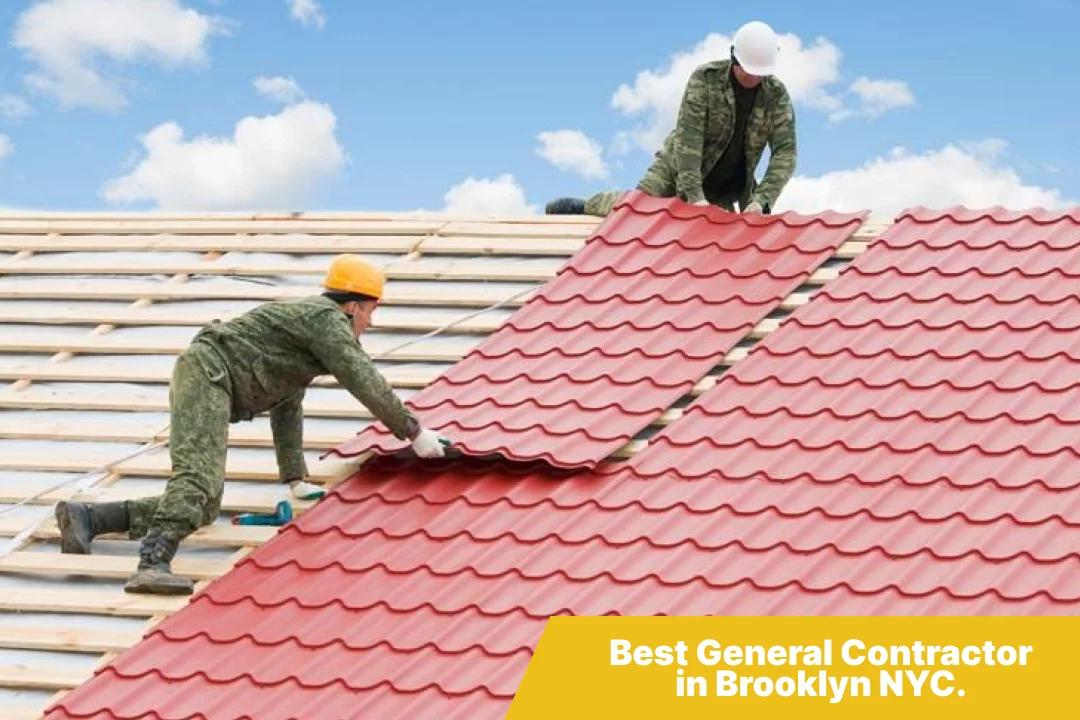
Choosing the Right Local Roofer in Brooklyn
When your Brooklyn home’s roof starts showing signs of wear, the search for the perfect contractor can feel like navigating a maze blindfolded. With over 30,000 residential buildings across Brooklyn’s diverse neighborhoods—from Park Slope’s historic brownstones to Williamsburg’s modern condos—choosing the right local roofer in Brooklyn requires more than just picking the first name from a Google search.
Your roof isn’t just another home improvement project; it’s your family’s primary shield against New York’s unpredictable weather patterns, from scorching summer heat waves to brutal winter nor’easters. Making the wrong choice could cost you thousands in repairs, endless headaches, and sleepless nights during the next storm.
Why Brooklyn Roofing is Unlike Anywhere Else
Brooklyn’s unique architectural landscape presents challenges that generic contractors simply can’t handle. The borough’s mixture of pre-war buildings, modern constructions, and everything in between means your roofer needs specialized knowledge of local building codes, historic preservation requirements, and the specific materials that work best in our coastal climate.
Consider the salt air from nearby harbors that accelerates corrosion, or the way Brooklyn’s urban heat island effect impacts material expansion and contraction. These aren’t textbook scenarios—they’re daily realities that only experienced local contractors truly understand.
The Hidden Costs of Choosing Wrong
Before diving into selection criteria, let’s examine what happens when homeowners rush their decision. Maria from Bay Ridge learned this lesson the hard way when she hired a contractor based solely on the lowest bid. Six months later, her “waterproof” roof was leaking into her kitchen, and the original contractor had disappeared. The repair bill? $15,000—triple her original budget.
This scenario plays out across Brooklyn neighborhoods weekly. The Better Business Bureau reports that roofing complaints account for nearly 40% of all home improvement disputes in New York City, with most stemming from inadequate vetting during the selection process.
The Brooklyn Roofer Selection Framework
1. Local Knowledge Assessment
Your ideal contractor should demonstrate intimate familiarity with Brooklyn’s microclimates and regulations. Ask potential roofers about:
- Specific challenges in your neighborhood (brownstone slate repairs in Park Slope differ vastly from flat roof maintenance in Sunset Park)
- Recent local building code changes
- Preferred suppliers for materials suited to Brooklyn’s weather patterns
- Experience with your home’s architectural style
A contractor who immediately starts discussing generic solutions without asking about your specific location and building type should raise immediate red flags.
2. Licensing and Insurance Verification
New York State requires roofing contractors to maintain proper licensing, but verification goes beyond checking a number. Contact the state licensing board directly to confirm:
- Current license status
- Any disciplinary actions
- Workers’ compensation coverage
- General liability insurance (minimum $1 million recommended)
Request certificates directly from insurance companies rather than accepting copies from contractors. Fraudulent insurance documentation is surprisingly common in the industry.
3. The Portfolio Deep Dive
Professional roofers should eagerly share recent work examples, but look beyond pretty before-and-after photos. Request:
- Addresses of recent projects in your neighborhood (with homeowner permission)
- Details about challenges encountered and solutions implemented
- Timeline documentation showing project completion dates
- Material specifications and warranty information
Skyline NY Inc exemplifies this transparency, providing detailed project documentation and encouraging potential clients to speak with recent customers.
4. The Estimate Evaluation Process
Collect at least three detailed estimates, but don’t automatically choose the middle option. Instead, analyze each proposal for:
Material Specifications: Vague descriptions like “premium shingles” mean nothing. Demand specific manufacturer names, model numbers, and grade classifications.
Timeline Clarity: Realistic contractors account for Brooklyn’s permit processing times, weather delays, and material delivery schedules. Be wary of promises that seem too good to be true.
Waste and Cleanup Protocols: Professional contractors include debris removal and site restoration in their estimates. Hidden cleanup costs can add thousands to your final bill.
Red Flags That Should End Conversations Immediately
The Door-to-Door Storm Chaser
After major weather events, out-of-state contractors descend on Brooklyn like vultures, offering “emergency repairs” at discounted rates. These operators typically:
- Pressure you to sign contracts immediately
- Demand large upfront payments
- Lack local licensing or insurance
- Disappear once they collect payment
Legitimate local contractors are busy with existing customers after storms and rarely need to solicit door-to-door.
The Cash-Only Discount
Any contractor offering significant discounts for cash payments is likely avoiding taxes, insurance requirements, or both. This arrangement leaves you without legal recourse if work quality suffers or injuries occur on your property.
Permit Avoidance
Brooklyn’s Department of Buildings requires permits for most roofing work, especially structural modifications. Contractors who suggest skipping permits to save money are inviting legal troubles that will become your responsibility.
The Communication Test
Schedule initial consultations with your top three candidates and evaluate their communication style. Professional contractors should:
- Arrive punctually for scheduled appointments
- Present clear business cards and marketing materials
- Ask detailed questions about your concerns and goals
- Provide written estimates within 48-72 hours
- Return phone calls promptly
Communication quality during the sales process directly predicts communication during project execution. If getting straight answers feels difficult now, imagine the frustration during construction.
Warranty and Service Guarantees
Brooklyn’s climate demands robust warranty coverage, but not all guarantees offer equal protection. Distinguish between:
Manufacturer Warranties: Cover material defects but not installation issues Workmanship Warranties: Protect against installation errors and typically range from 2-10 years System Warranties: Comprehensive coverage including both materials and labor
Ensure warranty terms are written into your contract, not just mentioned verbally. Understand exactly what scenarios trigger warranty coverage and what actions might void protection.
Financing and Payment Structure
Reputable contractors offer flexible payment options that protect both parties. Standard payment structures include:
- Small deposit upon contract signing (typically 10-15%)
- Progress payments tied to completion milestones
- Final payment upon project completion and inspection
Avoid contractors demanding:
- Full payment upfront
- Payments significantly ahead of work completion
- Payments to individuals rather than business entities
The Final Decision Matrix
After completing your research, create a decision matrix weighing factors most important to your situation:
Factor Weightings (customize based on your priorities):
- Local experience and reputation (25%)
- Licensing and insurance compliance (20%)
- Material quality and specifications (20%)
- Communication and professionalism (15%)
- Warranty coverage (10%)
- Timeline and scheduling (10%)
This systematic approach removes emotion from decision-making and ensures you’re comparing contractors objectively rather than being swayed by persuasive sales presentations.
Neighborhood-Specific Considerations
Historic Districts
Brownstone and historic district homeowners face additional complexity. Your contractor must understand:
- Landmarks Preservation Commission requirements
- Historic-appropriate materials and techniques
- Special permit processes for landmark buildings
Waterfront Properties
Homes near the Brooklyn waterfront require specialized attention to:
- Salt air corrosion resistance
- Enhanced wind load calculations
- Flood zone construction standards
Multi-Family Buildings
Apartment building owners need contractors experienced with:
- Tenant notification and coordination
- Commercial-grade materials and installation
- NYC Housing Authority compliance requirements
Making the Final Call
Once you’ve identified your preferred contractor, take these final steps before signing:
- Reference Verification: Contact at least three recent customers, asking specific questions about work quality, timeline adherence, and post-completion support.
- Contract Review: Have a qualified attorney review contracts exceeding $10,000. Investment in legal review often prevents costly disputes later.
- Start Date Confirmation: Establish realistic timelines accounting for permit approvals, material ordering, and weather conditions.
- Payment Schedule Finalization: Ensure payment terms match project milestones and never exceed work completed.
Your Brooklyn Roofing Success Story Starts Here
Choosing the right local roofer in Brooklyn transforms what could be your worst home improvement nightmare into a smooth, professional experience that adds value and security to your most important investment.
The extra time invested in proper contractor selection pays dividends through superior workmanship, reliable warranties, and peace of mind during Brooklyn’s next major storm. Your future self will thank you for choosing quality over convenience, expertise over empty promises.
Ready to begin your search with confidence? Contact Skyline NY Inc to discuss your Brooklyn roofing project with experienced local professionals who understand your neighborhood’s unique challenges and requirements.
Remember: your roof protects everything you value most. Choose the contractor who understands that responsibility and has the local expertise to deliver results that last.


